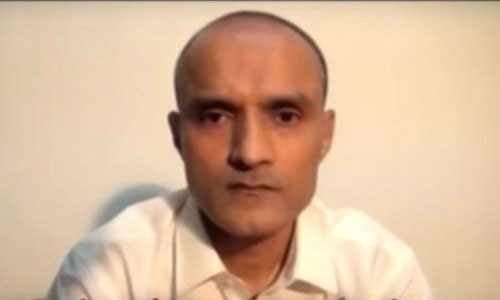Staff Reporter
Islamabad
Pakistan on Thursday provided consular access for a second time to Indian spy Kulbhushan Jadhav at Delhi’s request as Foreign Office spokesperson Aisha Farooqui reiterated the country’s offer to file an appeal in the Islamabad High Court against his conviction and subsequent death sentence by a military court.
In a statement, the Foreign Office spokesperson said that two consular officers of the Indian High Commission in Islamabad were provided “unimpeded and uninterrupted access to Jadhav at 1500 hours”.
Jadhav, a serving commander of the Indian Navy associated with Indian spy agency Research and Analysis Wing, was arrested on March 3, 2016, from Balochistan on allegations of espionage and terrorism.
“First consular access under the Vienna Convention on Consular Relations 1963 was earlier provided by Pakistan on Sept 2, 2019. The mother and wife of Commander Jadhav were also allowed to meet him on Dec 25, 2017.
“Commander Jadhav is in Pakistan’s custody following his arrest from Balochistan in a counter-intelligence operation on March 3, 2016. During investigation, Commander Jadhav confessed to his involvement in terrorist activities inside Pakistan that resulted in [the] loss of many precious human lives. He also made important revelations about RAW’s role in sponsoring state terrorism in Pakistan.”
The statement added that Pakistan remained committed to fully implementing the International Court of Justice’s judgement of July 17, 2019. “It is hoped that India will cooperate with the Pakistan court in giving full effect to the said judgement.”
Earlier Thursday, Farooqui had reiterated Pakistan’s offer to file an appeal in the IHC against Jadhav’s conviction at her weekly press briefing. “The time limit for filing a review petition is 60 days [set to expire on July 19]. We hope that India will cooperate in this regard.”
In a statement released shortly after, Foreign Minister Shah Mahmood Qureshi said that Jadhav had “confessed to terrorism with his own mouth”.
We accepted the decision of the ICJ, [but] India’s attitude has always been negative in this regard and they have not shown cooperation, he said. “However, our thinking is positive and we have presented all the facts to the world. We are proceeding forward within the parameters of the law.”
He added that the current Indian government had an extremist mindset which did not care for human rights or the law. “China has tried to improve relations between the two countries, but even China was not spared.”










